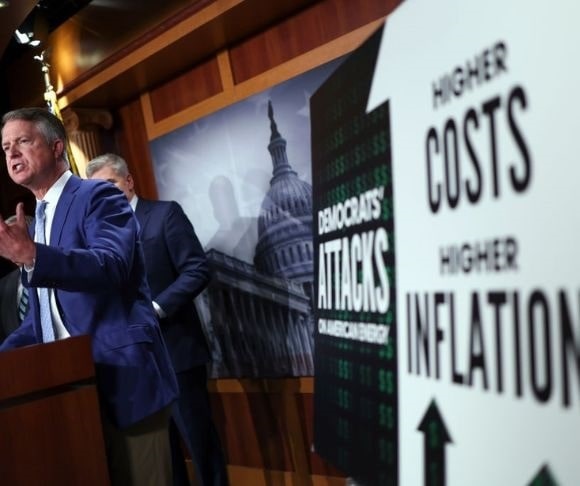
U.S. Sen. Roger Marshall (Photo by Kevin Dietsch/Getty Images)
The US economy is entrenched in a recession and inflation. For some reason, President Joe Biden and the Democrats thought it would be grand to raise taxes on most Americans and businesses to fund the Inflation Reduction Act, a slimmed-down version of Build Back Better. Sen. John Kennedy (R-LA) thinks “it’s a special kind of stupid” to institute higher taxes in this type of environment. But what is the effect of increasing tax rates amid stagflation?
Recession and Inflation? Tax Hike!
Washington is stuck between the printing press and a tax collector. On the one hand, when the nation is in the middle of an economic downturn or slowdown, the last thing any public policymaker would propose is higher wealth confiscatory rates. On the other, a greater penalty on income generation can partially help grapple with inflation since it will take money out of the real economy and put it in the pockets of politicians and bureaucrats who will blow it on boondoggles and blunders. Either way, it is a poison pill for election-obsessed officials.
Recent analysis from the Joint Committee on Taxation (JCT) shows that most Americans will see their taxes raised. But let’s say the left is correct and the legislation targets only wealthy corporations. This is still a levy on everyone because large companies do not pay corporate taxes – consumers, employees, and long-term economic growth bear the brunt.
Indeed, a corporate tax is passed on to customers in the form of higher prices for goods and services. Other studies find that workers also suffer from these levies since the workforce, mainly young and inexperienced employees, will endure approximately half of the burden through lower wages, benefits, perks, and overall compensation packages. In addition, economists typically purport that corporate taxes sacrifice long-term gains for short-term political expediency because companies will have less capital to invest, be it in employment opportunities or business expansion. When the Tax Cut and Jobs Act of 2017 was passed, Corporate America responded with increased pay, workplace investments, and expanded benefits.
What’s the Solution?
The Inflation Reduction Act of 2022 is being marketed as a legislative blitzkrieg to stop a recession and inflation. But the early estimates — from the Penn Wharton Budget Model to the Congressional Budget Office (CBO) — suggest that it does not achieve any of its aims. Here is what the experts say, even those who endorse the bill because it champions green energy: Inflation will hardly go down, the budget deficit will be reduced by $89 billion, and the gross domestic product (GDP) will either dip 0.1% or climb by 0.2% over the next decade. A verdict on the effects of the legislation may not arrive until 2030, but projections today show nothing more than a wasteland of progressivism.

U.S. Sen. Roger Marshall (Photo by Kevin Dietsch/Getty Images)
What we do know, however, is that the best way to stop price inflation is to shut off the printing presses, raise interest rates much higher than these paltry hikes of 50 or 75 basis points, and slash the federal budget and deficit. The problem, of course, is that this would usher in a deep recession. Unfortunately, everything has been distorted and manipulated after two years (or a decade, if you will) of easing monetary policy, deficit-financed spending, and feeding Wall Street and Main Street with cheap cash. If the government and the Federal Reserve stepped out of the way, Washington would bust inflation while ensuring long-term economic prosperity.
The United States might experience a dip in the July and August consumer price index (CPI), the producer price index (PPI), and the personal consumption expenditure (PCE). Why? Take a look at what slowing down money supply growth can achieve: Expansion of the M2 money supply metric (cash, checking deposits, and easily convertible near money) – or even the “true” or Rothbard-Salerno money supply measure (TMS) – has fallen to around 7% year-over-year, down from the 40% increase during the coronavirus pandemic.
Engineering a Recession
If the United States is not already in a recession, despite meeting the technical definition, it will be almost impossible for the expert class to dismiss a downturn in the future. Biden, the Democrats, and the Eccles Building are engineering a recession because any positives that the present US economy enjoys – and there are very few at this point – will be eviscerated through tax, spend, and regulatory schemes. The effects of the poorly named Inflation Reduction Act will not be seen for a while, so current policies from the incumbent administration are already an indictment of the failure of Bidenomics. The American people will now get more of the same, including an army of IRS agents to ring their doorbell.
Remember to check out the web’s best conservative news aggregator
Whatfinger.com — the #1 Alternative to the Drudge


